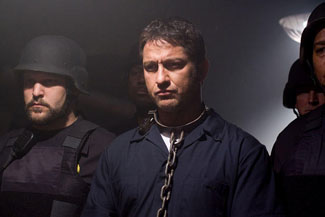|
|
Things I Learned from Movie X:
|

|
Before reading this column, just do something for me. Turn on your television (if it's already on, turn it off then turn it on again. Or you could leave it on, but it's just more satisfying to turn a television on) and flip through the channels. Chances are that you stumbled across at least one police procedural and/or lawyer show while you were doing this. Shows in which good, decent but often flawed detectives, solve crimes and equally good, decent but often flawed lawyers help them are ten a penny on network television, and for good reason; people like the security of knowing, deep down, that if something happened to them or their family, the justice system would catch and punish the people responsible. New at BOP: Share & Save
![]() Tweet
Tweet
![]() Print this column
Print this column
But what happens when the system fails - when those same cops and lawyers allow a guilty man to go free? That's the central question behind the hard-hitting exposé/in(s)ane thriller Law Abiding Citizen, in which Gerard Butler plays a man who watches as the man who killed his wife and daughter gets away with a light sentence, all thanks to some tricky legal shenanigans and the careerism of Butler's lawyer, Jamie Foxx. Butler then stages an increasingly elaborate (and increasingly illogical) revenge against the people who ruined his life, hoping to show how the judicial system fails to punish violent criminals by committing violent crimes. In doing so, the film teaches some valuable lessons about the way in which justice is (or isn't) carried out, such as:
The justice system is heavily weighed against grieving fathers
Since I've never been on a jury, all my knowledge about how the selection process works comes from the film Runaway Jury, which I'm sure is 100% accurate, despite having little in common with its predecessor, Runaway Bride. Anyway, that film taught me that the members of the jury have to say whether or not they harbor any prejudices that might color their opinion of the defendant, such as a prior relationship with the defendant, or a dislike of their race, gender, what have you. But the one prejudice you never hear about, because clearly it's so rife in the justice system, and society as a whole, as to not need vocalizing, is the average jury member's searing hatred of fathers who have just seen their young family butchered. I mean, what's not to hate about those guys? Knowing of this prejudice, Jamie Foxx, who I think is meant to be the hero, despite having no redeeming qualities whatsoever, tells Gerard Butler, playing one such grieving father (oh, how I hate them! With their impotent rage and deep, crippling sadness!) that with no DNA evidence to back up their case, Butler can't testify against the man who killed his wife and daughter, because who in their right mind would side with him over a clearly guilty man? Finally, someone takes a stand against this plague of men who have lost everything that are such a blight on society.
Continued:
1
2
[ Email this column ]

|
|
|

|
Monday, December 15, 2025
© 2025 Box Office Prophets, a division of One Of Us, Inc.

